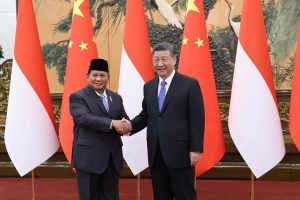President-elect Prabowo Subianto’s visit to Beijing, at the invitation of the Chinese government, signifies a potential pivot in Indonesia’s foreign policy toward China. This visit comes at a crucial time, as Indonesia seeks to assert its position in the region amid escalating China-U.S. rivalry.
Examining Prabowo’s historical stance toward China unveils a complex narrative. During the 2019 Indonesian presidential election, he criticized Chinese investments in Indonesia, pledging to review them if elected. However, his appointment as defense minister later in the same year raised questions about the consistency of his position. His cautious handling of the Natuna Sea incident, where Chinese vessels encroached into Indonesia’s exclusive economic zone, further complicated perceptions of his approach to China.
Prabowo’s recent visit to Beijing hints at a potential recalibration of his stance. The promptness of China’s invitation and Prabowo’s acceptance suggest a willingness on both sides to strengthen ties. This could be seen as a pragmatic move by Prabowo, recognizing China’s importance as a major trading partner and investor in Indonesia’s infrastructure development. According to Jusuf Wanandi, a Sino-Indonesian politician and co-founder of the Jakarta-based Centre for Strategic and International Studies think tank, “The cooperation between Indonesia and China not only benefits Indonesians and Chinese but also extends its advantages to all the peoples of East Asia.”
However, China-Indonesia relations are not without challenges. From a strategic perspective, Prabowo’s visit comes at a time of heightened China-U.S. rivalry, where Indonesia finds itself navigating a delicate balance between the two powers. The United States has been urging Indonesia to take a tougher stance on China’s assertiveness in the region, particularly in the South China Sea. Prabowo’s approach to this delicate balancing act will be closely watched, as it could have implications for Indonesia’s regional standing and security.
Another crucial aspect to consider is the strategic implications of Indonesia’s relationship with China. While China is a key economic partner for Indonesia, with significant investments in infrastructure and trade, there are concerns about the implications of China’s growing influence in the region. Indonesia’s diverse geopolitical and economic interests require a careful and strategic approach to managing its relationship with China.
Further complicating matters are Prabowo’s own past experiences, notably his alleged involvement in the 1998 riots, which largely targeted ethnic Chinese Indonesians. According to a fact-finding team, Prabowo was a key figure in military involvement with rioters in Jakarta. This historical baggage adds layers of complexity to Prabowo’s evolving political persona and his approach to China.
Overall, the Prabowo we see now appears to be quite different from the one in 2019.
The transformation of Prabowo’s political image is not only because he chose current President Joko “Jokowi” Widodo’s son as his running mate in this year’s election and promised to continue Jokowi’s series of policies – including maintaining friendly relations with China – but also because Prabowo realizes that whoever is elected must acknowledge Indonesia’s bargaining power with China. Given China’s rising global power status and presence in Southeast Asia, Indonesia recognizes the strategic importance of engaging with China.
Unlike the Philippines under Ferdinand Marcos Jr., Indonesia is unlikely to heavily tilt toward the United States. Jokowi’s government has pursued a pragmatic and stable foreign policy, anchored in a steadfast non-aligned stance. This approach has enabled Indonesia to mitigate the repercussions of China-U.S. competition while leveraging its geopolitical advantages.
That said, Prabowo’s reputation for being temperamental and unpredictable adds an element of uncertainty to Indonesia’s foreign policy trajectory.
Prabowo’s pre-inaugural diplomatic engagements, including visits to both Beijing and Tokyo, could be interpreted as a balancing act aimed at addressing concerns ahead of assuming office. His visit to Beijing presents an opportunity to reassess and recalibrate China-Indonesia relations. As Indonesia navigates the complexities of the China-U.S. rivalry and asserts its interests in the region, Prabowo’s approach to China will shape the country’s future trajectory on the international stage.































